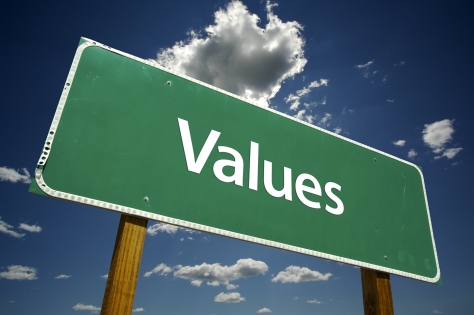Serena Sutherland
America values a lot of things. We value freedom, independence, hard-work, capitalism, iPhones, Tesla cars, McDonalds – the list goes on. Yet, why do we value these things, and not the core of our country, immigration?

The issue lies here: half of what we value are not values. They are beliefs. According to Oxford Bibliographies, values (in the context of sociology) are, “relatively abstract notions that inspire our beliefs and attitudes and determine what we strive for.” We also know that values are deeply connected with our morals and sense of self, and rarely do they change or bend. That’s why mistaking values for beliefs is problematic – we don’t want to compromise, even on something as flimsy as a personal belief. No progress is being made on the issue of immigration – in fact, it could be argued that the issue has backpedaled and is becoming worse. Some believe immigrants are lazy. This wrongfully transforms into a value that immigrants should not be allowed into the country. In our research with OneAmerica, we are taking the lense of Values and learning what is going wrong with our government and social ideals.
We learned that OneAmerica was founded after September 11, 2001, to battle hate toward the Muslim community. After 9/11, people began to believe all Muslims were terrorists, and with the confusion around what is a belief and what is a value, we convinced ourselves that this is a value of safety. Reasonably, people will not budge on an issue is they think it will compromise their safety, but they are unwilling to learn and understand how Muslim-Americans are only a threat to their safety because they believe they are, and their beliefs are thinly supported by facts and logic. But they will not listen to the other side. This is how our group is applying values to the immigration issues we are researching with the help of our community partner, OneAmerica.

Our team set out to understand how to help the immigrant communities, and with the help of OneAmerica, a nonprofit organization that battles for immigrant communities, we may have found some answers. Pavan Vangipuram, the communications manager at OneAmerica, was kind enough to give his time and allowed us to ask some questions about OneAmerica. When we asked how they try to re-imagine and reform immigration issues in our government, Pavan replied, “We partner with the city and with other organizations to…link [immigrants] up with opportunities to help them out with their citizenship application, and then once they become citizens, they can be more actively engaged…in [voting] and could even run for office.” He then added, “[OneAmerica] believes very much that…communities know what’s best for them.”
I found this response to be very interesting. OneAmerica not only protests on behalf of immigrants, but gives them the tools they need to represent themselves, because there is obviously an issue in representation when we call immigrant families “a drain to our society.” Our country was founded by immigrants, and has stayed afloat because of immigrant labor and ideas. In historical contexts, immigrants have always been apart of the United States. However, they never got to represent themselves because they didn’t hold the power or tools to do so. The Irish were drunk and lazy, the Japanese were demonized after the attack on Pearl Harbor, and Mexicans are portrayed as drug-dealers. To solve this misunderstanding, OneAmerica promotes replacing government officials with candidates of immigrant and racial descent, which can help slowly shift people’s beliefs about immigrants and, overtime, make America value immigration again.

Looking back on history when our country was first founded, the United States government had very little empathy for Native Americans. As Ronald Takaki explains in his book, A Different Mirror: A History of Multicultural America, Takaki teaches his readers about the 1871 Indian Appropriation Act, in which he explains how the act, “[was] not a mere prohibition of the making of future treaties with the tribes…[it] [destroyed] the political existence of the tribes.” The Act completely disabled the Native Americans because the United States government valued their “manifest destiny” over the Native’s basic human rights.
To prevent history from repeating itself, OneAmerica hopes to get immigrants involved in U.S. politics. But then another question arises: if immigrant communities are already talking to us, why aren’t we listening? Why aren’t reforms being made, and why did we elect Donald Trump as president? Why isn’t America progressing?
Neil Postman, author of Amusing Ourselves to Death: Public discourse in the Age of Show Business, writes, “Americans no longer talk to each other, they entertain each other.” We watch TV, we read the news online, and are so enthralled by political stories and accusations that we fail to respond – we only observe, and once the news anchor moves onto the next topic of interest, the issue is near forgotten. We are only entertaining ourselves with public discourse as if reading a fantasy novel, and we believe simply hearing about the news is a civic duty. According to Black’s Law Dictionary, a belief is, “not a product of the reason but of the imagination, that is, not a mistake of fact induced by deception, fraud, insufficient evidence, or erroneous reasoning, but the spontaneous conception of…imagination.” Why haven’t we learned the belief that we are civically engaged simply by watching the news – is, at its best, untrue, and at its worst, destructive?

Author of post: Serena Sutherland
References:
Black, H. (1910). Law Dictionary Containing Definitions of the Terms and Phrases of American and English Jurisprudence, Ancient and Modern and including the Principal Terms of International, Constitutional, Ecclesiastical and Commercial Law, and Medical Jurisprudence, with Collection of Legal Maxims, Numerous Select Titles from the Roman, Modern Civil, Scotch, French, Spanish, and Mexican Law, and Other Foreign Systems, and Table of Abbreviations. St. Paul, Minn., West Publishing Co.
Jaspers, E. (n.d.). Values. Retrieved February 10, 2018, from http://www.oxfordbibliographies.com/view/document/obo-9780199756384/obo-9780199756384-0182.xml
OneAmerica. (n.d.). Retrieved February 9, 2018, from http://weareoneamerica.org/
Postman, N. (2007). Amusing Ourselves to Death: Public Discourse in the Age of Showbusiness. London: Methuen.
Takaki, R. (2008). A Different Mirror: A History of Multicultural America. New York, NY: Back Bay Books
